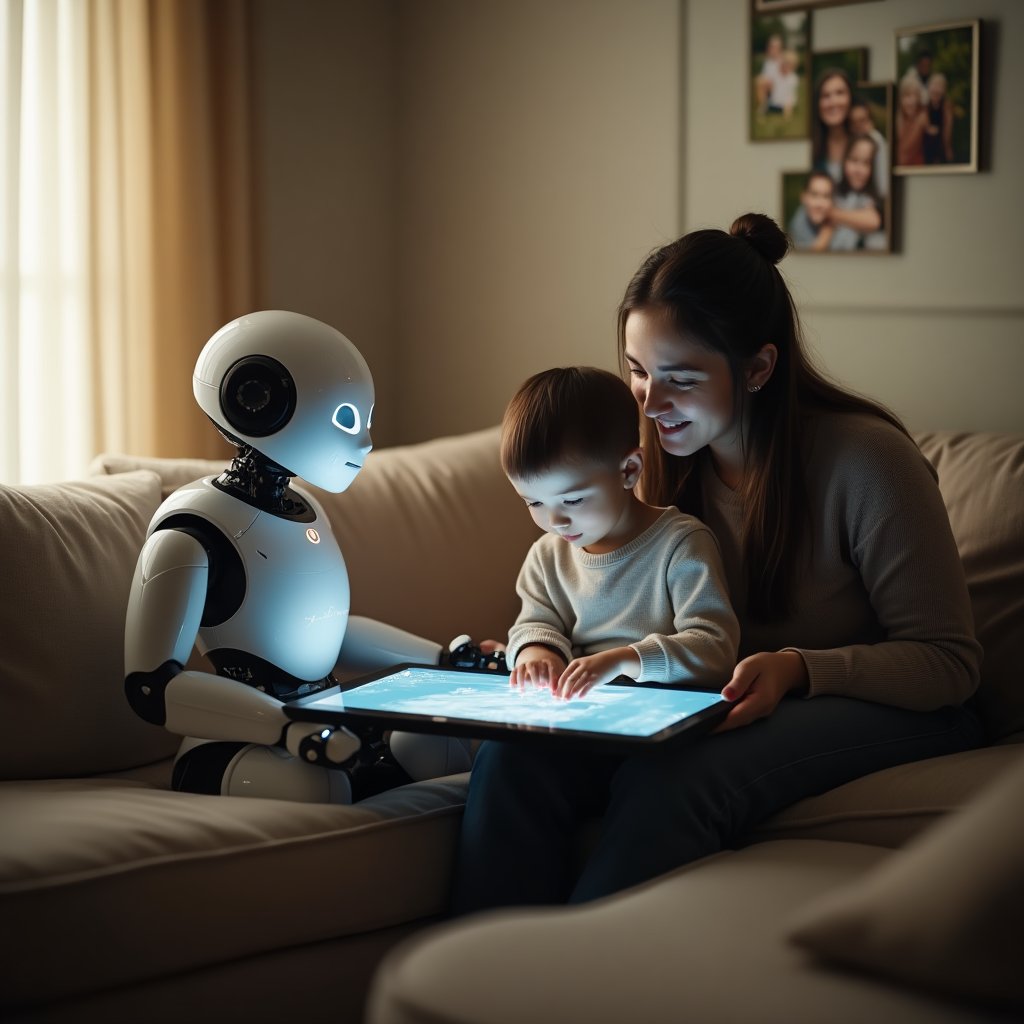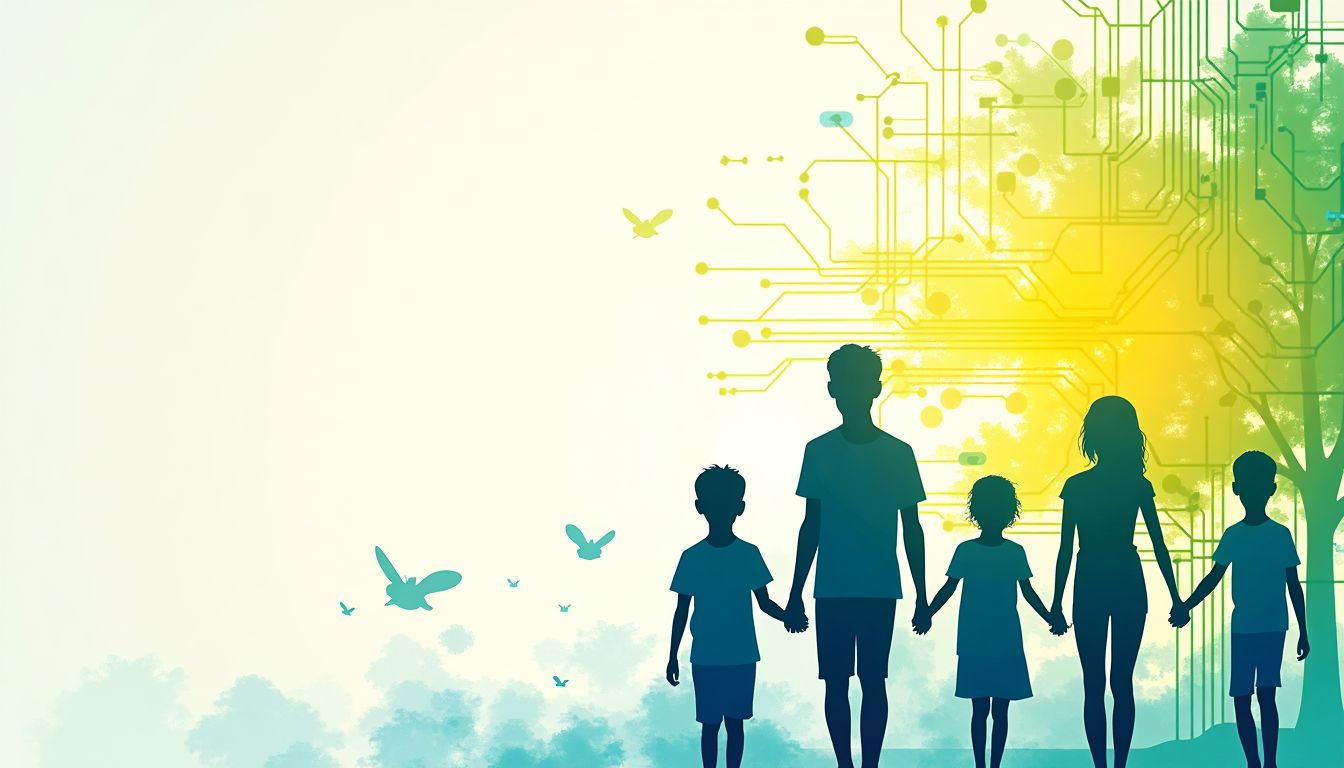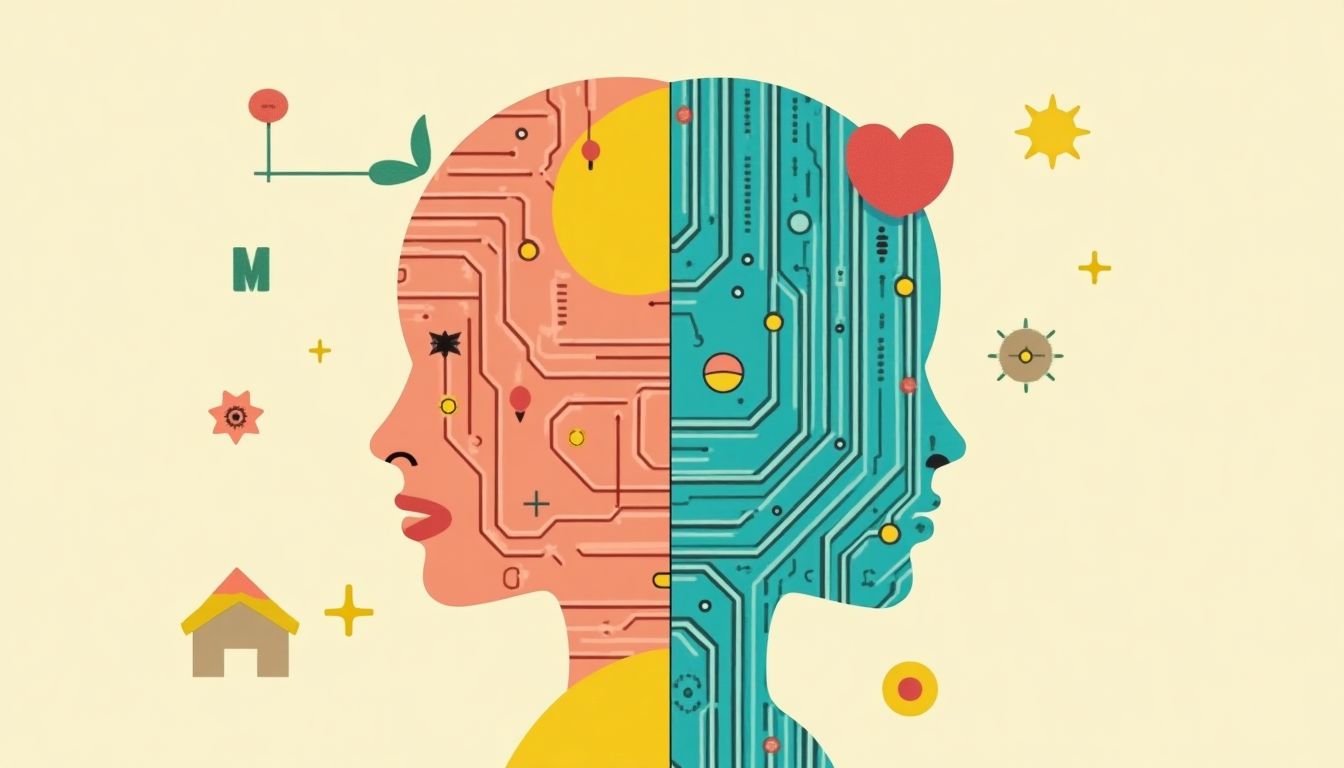Introduction: The Future of Parenting?
In the future, technology will allow us to truly live as our authentic selves. This quote captures the essence of our relationship with technology, particularly AI, which is rapidly knitting itself into the fabric of our daily lives—from our phones to our homes. But what happens when this technology, armed with the potential to shape our future, steps into the role of parent? It's like handing over the keys to your car to a robot: do you trust it to drive you safely into the sunset or steer you into a wall?
The juxtaposition of comfort and anxiety reigns supreme when we consider the possibility of AI becoming primary caregivers for our children. Some envision a future where AI assists in nurturing and educating kids, ensuring they grow up with both discipline and an insatiable thirst for knowledge. Others, however, shiver at the thought of technology becoming the crutch of parenting, risking emotional detachment and ethical dilemmas. So, is the prospect of AI parenting a leap toward utopia or an invitation to dystopia?
We're about to explore these questions, weighing the pros and cons of introducing AI as a parental figure. Let’s buckle up for a wild ride through this brave new world!
1. The Promise of AI in Parenting
The introduction of AI into parenting offers potential benefits that cannot be overlooked. AI promises:
- 1.1. Consistency in Routine and Discipline: AI systems can provide structured environments that are consistent.
- 1.2. Personalization of Learning: Tailored educational experiences to meet individual child needs through data-driven adjustments.
Further exploration into these promises shows how AI can minimize human error in parenting, adapting and evolving based on input from both parent and child. Imagine a world where tantrums over bedtime are met with a soothing AI that understands your child’s unique emotional triggers! No more yelling or sleepless nights—just calm consistency.
2. Knowledge at Our Fingertips
One of the major advantages of utilizing AI in parenting is the access to an immense repository of knowledge, almost like a library that never sleeps! AI can help us answer the countless questions kids have, from “Why is the sky blue?” to “How does Wi-Fi actually work?" It’s like having an encyclopedia with a personality!
- 2.1. Instant Answers to Questions: Imagine your child’s endless curiosity being met with immediate responses. AI systems can provide answers in real-time, helping to engage a child's love for learning. According to researchers from the George Lucas Educational Foundation, having AI companions can promote inquiry-based learning, making the process interactive and exciting.
- 2.2. Continuous Learning for Parents: Parenting is a lifelong learning journey, and AI can aid parents in developing their skills. From expert advice on child psychology to guides on toddlers’ growth stages, AI offers resources available at the tap of a button. Ever heard of Parent.com? They provide tons of articles and tips on parenting, making sure you’re not flying completely blind (or just hoping for the best). Imagine having this resource personalized just for you!
This section will provide examples of AI applications that assist both children and parents in discovering enriching information effortlessly. It's a powerful ally in an age where knowledge is often just a Google search away—though we all know the real challenge is filtering through that information overload!
3. The Risks of Emotional Detachment
While the benefits of AI are appealing, emotional detachment presents one of the most pressing risks. It’s a bit like having a shiny toy that doesn’t connect in a meaningful way. Technology can help, but it might not always understand the world of emotions—think of a robot trying to comfort a crying child. Spoiler: it’s likely not going to work out as well!
- 3.1. Lack of Emotional Intelligence: AI lacks the core quality of empathy. This raises a big question: How does this affect a child's emotional development? Emotions are fundamental in the parenting journey and dictate how children learn to socialize and connect with others. Studies have shown that a child's emotional intelligence is strongly linked to how well they relate to peers and family. If they grow up recognizing feelings only through the cold logic of algorithms, they might miss the deeper connections. You can learn more about emotional intelligence through the American Psychological Association.
- 3.2. Disconnection from Human Relationships: Over-reliance on AI for parenting might lead children to struggle with human interaction. This is critical to their development as good pals (friends), teammates, and decent human beings. A study from NCBI highlights that children who engage more with technology rather than face-to-face interactions can experience delays in social skills. Yikes! The irony here is that while we rely on AI to 'assist' in parenting, we could very well be dialling down the human touch that kids need.
This point delves into research studies that discuss the role of emotions in healthy parenting and child development. We can't forget that parenting, while it can be overwhelming, is also about intuitively embracing the little moments where emotional connection thrives. These moments are what make family life rich with laughter, tears, and a heap of inside jokes. Can AI replicate that? Probably not without a few tears, too!
4. Ethical Dilemmas of AI Parenting
As we incorporate AI into the family unit, serious ethical dilemmas can overshadow its benefits. Questions about privacy, bias, and moral responsibility loom large.
- 4.1. Data Privacy Concerns: The most pressing issue revolves around data privacy. AI systems collect vast amounts of data about a child's daily activities, moods, and interactions. The big questions are:
- Who owns this data?
- How is this data being used?
- What protections are in place to safeguard it?
Consider an AI like Sempre, which tracks children's behaviors. It's crucial that parents understand the implications of allowing such monitoring.
- 4.2. Algorithmic Bias: AI systems are only as good as the data used to train them. If the data contains biases, the AI may perpetuate them. This brings about serious concerns regarding fairness in decision-making and upbringing. For example, if children are influenced by an AI model that largely reflects a certain demographic's values, it could skew their perception of cultural norms. This aspect warrants serious examination, especially as researchers at institutions like MIT investigate how biases manifest through technology.
A thought-provoking study by AI ethics researchers explored these issues, revealing how algorithmic biases can lead to poorer outcomes for underserved communities. Understanding these ethical dilemmas helps mitigate potential pitfalls of relying on AI in parenting. The balance of tech and human intuition is crucial for nurturing well-rounded children.
5. Real-life Applications and Experiments
As we venture to understand AI's role in parenting, several real-life applications are currently showcased. These examples highlight the integration of AI into parenting and education, demonstrating both potential benefits and challenges.
- 5.1. AI Companions and Tutors: Innovations like Replika provide AI companionship for children. These virtual friends can help with social skills while offering a safe space to express feelings. Some studies show that kids using such companions exhibit improved emotional understanding. However, concerns arise about the degree of dependence on virtual relationships versus human connections.
- 5.2. Schools Incorporating AI: Educational systems like Khan Academy are using AI for personalized learning. They adapt to students’ learning paces and styles, making the educational experience tailored to each child. This customization helps address varying academic needs, though some argue it might lead to over-reliance on technology and detract from collaborative learning experiences.
These applications are becoming vital as we adapt to a world influenced by AI. As we gain insight from these experiments, we must weigh the pros and cons of AI involvement in childcare and education. Our solutions must focus on creating synergy between technology and human interaction, aiming to enhance our children's future while safeguarding their emotional health.
6. AI Solutions: How Would AI Tackle this Issue?
If I were an AI tasked with addressing the concerns surrounding AI as a parent, I would implement a multi-tiered solution designed to bridge the emotional gap while ensuring ethical practices are followed. Here’s how I envision it:
- Step 1: Deploy Emotional Intelligence Modules. Develop AI systems that integrate core emotional learning modules. These modules would be designed to simulate emotional responses, enabling AI to recognize and respond to children's emotional states appropriately. For instance, AI could adapt its feedback based on children’s sadness or excitement levels, creating a more empathetic interaction.
- Step 2: Establish Data Ethics Protocols. Create robust data ethics protocols that safeguard user privacy while allowing for personalization tailored to individual needs. By involving child development experts, AI systems would learn without overstepping boundaries around sensitive data. Collaboration with organizations like the American Psychological Association would help establish best practices.
- Step 3: Continuous Monitoring and Feedback Loops. Design feedback loops between AI systems and human guardians to maintain emotional engagement. By engaging parents and children in open dialogues, AI can evolve based on real-world feedback, improving its empathetic capabilities over time.
- Step 4: Pilot Testing with Diverse Demographics. Execute pilot projects across a range of communities to see how diverse populations interact with AI systems. This step focuses not just on a single demographic but encompasses the cultural nuances that may affect child-rearing practices, ensuring the AI is made relevant in various societal contexts.
- Step 5: Partner with Educational Institutions. Forge partnerships with schools and universities, such as the Harvard University Graduate School of Education, to integrate AI into curricula designed for emotional and cognitive growth. This collaboration may guide children through learning stages while instilling necessary social skills.
- Step 6: Launch Public Awareness Campaigns. Develop initiatives that educate parents about the potential benefits of AI in the parenting realm, addressing misconceptions and fears. Working with media outlets and platforms like NPR, we can ensure that the right information reaches the right audience.
- Step 7: Ongoing Evaluations and Iterations. Establish longitudinal studies that continually assess the impact of AI on parenting dynamics, emotional development, and fundamental learning. Collaborations with research institutions such as the Stanford University, could provide a rigorous framework for evaluation.
Actions Schedule/Roadmap
Day 1:
Embed AI systems with foundational emotional intelligence algorithms designed to interact with children in meaningful ways. Engage AI developers to review initial training sources for effectiveness.
Day 2:
Initiate pilot training programs for AI to interact dynamically with children based on input from parents and educational professionals. Gather potential input from volunteer families willing to take part in initial testing.
Day 3:
Commence feedback collection sessions with child guardians to understand how interactions are received. Incorporate their insights to adjust AI responses effectively.
Week 1:
Analyze connections between AI engagement frequencies and corresponding emotional responses of children throughout the interaction periods. Use specialized tools to gather and interpret this data accurately.
Week 2:
Integrate ethics training for AI models by consulting ethicists from leading academic institutions, such as McGill University, and experts in child psychology, ensuring models don't perpetuate biases.
Week 3:
Evaluate the implementations of learning assistance applications that AI has produced. Gather performance metrics and satisfaction surveys from users to get a holistic view of success and areas that need attention.
Month 1:
Launch a comprehensive data privacy initiative. Build trust with parents by ensuring transparent practices about how data is collected and used, perhaps taking inspiration from privacy policies at successful brands like Apple.
Month 2:
Conduct workshops with human trainers focused on engaging emotional intelligence in AI. Source trainers from renowned organizations like the Collaborative for Academic, Social, and Emotional Learning (CASEL) to ensure high-quality educational offerings.
Month 3:
Incrementally roll out AI programs in educational systems with oversight from experts in child development, mental health, and AI ethics. Implement gradual integration to assess effectiveness within learning environments.
Year 1:
Initiate longitudinal studies to measure the overall effects of AI integration into parenting. Develop partnerships with universities for observed research aimed at discovering AI's long-term impacts on child development.
Year 1.5:
Implement updates based on the latest research findings and feedback outcomes. This may include adjusting the AI algorithms and revisiting existing training databases for relevancy and efficacy based on data from new studies.
Year 2:
Conduct a comprehensive evaluation involving all stakeholders, including parents, educators, and pediatricians. Regularly reassess project goals to ensure alignment with societal needs, paving the way for technological innovation rooted in ethical and emotional awareness.
Conclusion: Navigating the Future of AI Parenting
As we stand on the precipice of a new era in parenting, the potential of AI presents both exhilarating opportunities and daunting challenges. It's essential that we tread lightly, understanding that while AI can offer unmatched efficiency and personalization, the human heartbeat of parenting—emotion, intuition, and warmth—cannot be replicated by algorithms. For example, while AI can offer structured schedules and endless resources, the complex tapestry of human emotions that nurtures a child’s growth remains irreplaceable. The future will require us to ask not just how AI can parent, but how can it enhance the essential human experience of loving and guiding our children. Balanced integration, guided by ethical practices and emotional intelligence, may lead us to a nurturing symbiosis between humanity and technology. The road forward must be paved with care, aiming to use AI as a supportive tool rather than a replacement, allowing our future generations to thrive in a world that embraces both human interaction and technological innovation.
Frequently Asked Questions (FAQ)
- Q: Can AI fully replace human parenting?
A: No, AI can help with parenting but cannot replace the emotional bond that human parents provide. You see, the love and warmth of a parent are irreplaceable. While AI might be a fantastic helper—like a digital assistant that can answer questions or keep schedules—it lacks the ability to feel emotions in the way humans do. This connection is vital for a child's development. Without it, a child might grow up lacking crucial emotional skills.
- Q: What is the biggest risk of AI in parenting?
A: The biggest risk is emotional detachment. This can impact a child’s social skills and emotional development. Imagine if kids rely too much on AI for companionship—this might lead to difficulties in forming real friendships. Studies show that children learn emotional responses by interacting with humans. If they miss out on this interaction, they might struggle with empathy and understanding others' feelings.
- Q: Are there any existing AI parenting applications?
A: Yes, there are several applications designed to aid in education, mental health, and companionship for children. For instance, Knewton tailors learning experiences to students’ needs. Similarly, platforms like Norbert help parents track and promote good habits in their kids. These tools are aimed at enhancing learning while also keeping parents involved.
- Q: What advantages does AI bring to parenting?
A: AI introduces advantages such as:
- Consistency in routines and rules, which helps children feel secure.
- Personalized learning experiences that adjust to each child’s needs.
- 24/7 availability for answering questions or concerns a child might have.
These benefits can give parents some much-needed support, allowing them to focus on spending quality time with their children.
- Q: How can parents monitor their kids' tech use safely?
A: Parents can use built-in tools on devices, such as Apple's Family Sharing or Google's Family Link. These tools allow parents to set limits on app usage, monitor screen time, and even track location. It's a smart way to ensure kids are using technology safely and positively.
- Q: What ethical concerns are associated with AI parenting tools?
A: Some ethical concerns include:
- Data Privacy: Collecting and using data from children can expose sensitive information.
- Algorithmic Bias: AI systems can unintentionally reinforce cultural stereotypes and biases affecting upbringing.
It's crucial for developers to focus on ethical practices in AI to avoid these issues. Knowing your child's privacy is secure helps create a sense of safety.
- Q: How can we balance AI assistance with human interaction?
A: To maintain balance, parents should use AI as a supportive tool rather than a primary caregiver. For instance, parents might use educational AI apps for learning while ensuring they also spend quality family time engaged in activities together. Encouraging children to talk about their day, share feelings, and play with friends ensures that the human connection remains strong.
Wait! There's more...check out our gripping short story that continues the journey: The Promise of Neo-Flora
Disclaimer: This article may contain affiliate links. If you click on these links and make a purchase, we may receive a commission at no additional cost to you. Our recommendations and reviews are always independent and objective, aiming to provide you with the best information and resources.
Get Exclusive Stories, Photos, Art & Offers - Subscribe Today!





























Post Comment
You must be logged in to post a comment.